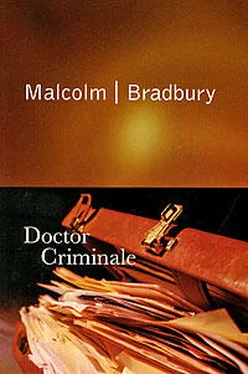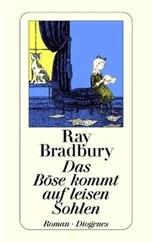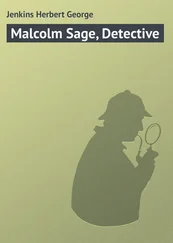Malcolm Bradbury - Doctor Criminale
Здесь есть возможность читать онлайн «Malcolm Bradbury - Doctor Criminale» весь текст электронной книги совершенно бесплатно (целиком полную версию без сокращений). В некоторых случаях можно слушать аудио, скачать через торрент в формате fb2 и присутствует краткое содержание. Город: London, Год выпуска: 2000, ISBN: 2000, Издательство: Picador, Жанр: Современная проза, на английском языке. Описание произведения, (предисловие) а так же отзывы посетителей доступны на портале библиотеки ЛибКат.
- Название:Doctor Criminale
- Автор:
- Издательство:Picador
- Жанр:
- Год:2000
- Город:London
- ISBN:978-0330390347
- Рейтинг книги:5 / 5. Голосов: 1
-
Избранное:Добавить в избранное
- Отзывы:
-
Ваша оценка:
- 100
- 1
- 2
- 3
- 4
- 5
Doctor Criminale: краткое содержание, описание и аннотация
Предлагаем к чтению аннотацию, описание, краткое содержание или предисловие (зависит от того, что написал сам автор книги «Doctor Criminale»). Если вы не нашли необходимую информацию о книге — напишите в комментариях, мы постараемся отыскать её.
Doctor Criminale — читать онлайн бесплатно полную книгу (весь текст) целиком
Ниже представлен текст книги, разбитый по страницам. Система сохранения места последней прочитанной страницы, позволяет с удобством читать онлайн бесплатно книгу «Doctor Criminale», без необходимости каждый раз заново искать на чём Вы остановились. Поставьте закладку, и сможете в любой момент перейти на страницу, на которой закончили чтение.
Интервал:
Закладка:
‘Including Doctor Criminale,’ I said. Codicil looked coolly at me for a moment. ‘Only so-so,’ he said, ‘We were never what is called intimate.’ ‘I suppose he was a student of yours?’ I asked. ‘Of mine, no, never, not at all,’ said Codicil, emphatically, ‘I think in your ignorance you mistake our two ages. I am hardly older than he is. Further when he was here in Vienna after the war he studied only Pädagogie, never Philosophie. I know him only as one scholar knows another. We have had many congresses together, and so on.’ ‘But he’s in Vienna quite often?’ I asked. ‘Vienna is but one of his many home from homes, you know. Or shall I say homes from home?’ ‘Homes from homes?’ suggested Gerstenbacker. ‘And it was on visits like that he gave you the biographical material for the book?’ I asked. ‘A book, well, better call it a small hommage ,’ said Codicil, ‘A hat one doffs to an academic confrere. It is hardly the most notable of my works.’ ‘But it’s the key work on him, and it’s full of good personal information,’ I said, ‘In fact he seems to have told you everything.’
Codicil stared at me, then laughed. ‘Everything, and what is everything?’ he asked, ‘Who has ever known everything, except Our Good Lord above. There is no everything. Do we begin to know everything about ourselves? Remember Wittgenstein, now you are in Vienna. What did he say? “How could I expect you to understand me, when I barely understand myself!” Or as Criminale himself put it better: “Where is the man who can even begin to name himself?”’ He smiled blandly at me. I knew very well that the role of elusive thinker and questioner had an undying charm for his whole profession, but I felt that he was using the art to divert me, so I ploughed on. ‘But Criminale did give you many of the biographical facts of your study?’ I asked. ‘A fact, explain me, what is a fact?’ asked Codicil, starting the fancy philosophical footwork all over again. ‘By a fact I just mean the plain simple details,’ I said, ‘Like where he actually was born, who his parents were, where he studied, who he married, who taught him, who influenced him.’ ‘But any ordinary scholar could find all this,’ said Codicil. ‘Not really,’ I said, ‘There seems to be an awful lot of misinformation around about Criminale.’
‘So, about what?’ asked Codicil. ‘About how he left Bulgaria after the war, how he got here to Vienna,’ I said, ‘About how he got on with the Marxist authorities, about his political attitudes. Half the stories contradict one another.’ Codicil pulled a face. ‘These things are not all facts,’ he said, ‘They are interpretations. If you like to be a dry-as-dust sort of person, you may well believe in facts. But surely you do not come to the home of linguistic philosophy and the Vienna Circle to waste your time only on some little facts.’ ‘I believe you’re described as a historian as well as a philosopher,’ I said. ‘So?’ asked Codicil. ‘So how would you judge Criminale’s role in recent political history?’ ‘In intellectual history, please,’ said Codicil, ‘Here he is of utmost importance. The great thinker of our time.’ ‘But don’t you find some of his thought ambiguous and contradictory?’ I asked. ‘What thought is not?’ said Codicil, shifting heavily on his bentwood chair.
I tried again. ‘I’m talking about his dealings with the Communist Party and so on,’ I said. ‘My dear sir, allow me to say this to you,’ said Codicil at last, ‘To understand thought, you must first understand thinking, and where it occurs. In the mind and in history. To understand history, you must first have experienced it. I will confess to you I think you understand neither one of these things. There is a saying: to think greatly, you must also err greatly. I do not say Criminale erred. But we are talking of a great mind, the Nietzsche of our long, dark, dying century. We cannot presume even to begin to advise such a man, a man bigger than men, how to understand history, or interpret it correctly. We may merely observe how he has chosen to understand it. Do you follow me?’ ‘Yes,’ I said. ‘And you agree?’ ‘Well, no, not quite,’ I said, ‘I think everyone can be held responsible for their thinking.’
‘So I see,’ said Codicil, ‘What is the time, Gerstenbacker?’ Gerstenbacker looked at him blankly for a moment, and then said, ‘Oh dear, your lecture, Herr Professor. I think your students are already waiting you.’ ‘Quite, now that really is what our very young friend would call a fact. Please excuse me, sir, I have duties to perform.’ Codicil stood up, vast, and waved at the waiter. He had evidently had enough, if not too much, of me; I saw I was about to lose him. ‘One more question,’ I said, ‘Would you be willing to appear in our programme, just saying this?’ ‘Ever the sweet sweet blandishments of the media,’ said Codicil, opening his wallet wide to pay the waiter, ‘No, I am not. I am a busy man. I am a friend of ministers. I am extremely sorry, but I really have no time for your little ephemera.’ ‘Then may we stay in touch?’ I asked quickly, ‘Can we come to you for advice?’
‘If you have questions, pass them through Gerstenbacker,’ said Codicil, pulling on his topcoat, ‘I am giving you Gerstenbacker.’ ‘I beg your pardon?’ I asked, not understanding. ‘My young assistant has offered to show you Vienna, since I think you do not know it very well,’ said Codicil, ‘He will give you his best assistance in any researches you like to make. However I fear you will quickly find that not everyone in this city likes questions. Also I think you will discover there is almost nothing to learn of Criminale in Vienna. His main life was always elsewhere, in other cities. But Gerstenbacker is helpful and a very good fellow. And as he told you he was in Britain once, so he knows your ways. Wiedersehen, young man.’ And Codicil patted my shoulder, shook my hand very firmly, and, the great professor, walked out through the other great professors, nodding gravely here and there. Through the window I could see him turn in the street, and stride off, briskly, largely, and I thought angrily, in the direction of the university buildings. I had not, alas, much advanced my quest for Bazlo Criminale.
4
In his wing collar, Gerstenbacker sat there . . .
So my man had gone. All I had left was young Gerstenbacker, sitting there opposite me in his natty wing collar, looking at me eagerly. Evidently he was waiting for me to say something; I did. ‘Professor Codicil certainly speaks very good English,’ I remarked to him. ‘Of course, they say he speaks the best English in the world,’ said Gerstenbacker, with the simple admiration of the perfect Germanic research assistant, ‘Now what do you like to do with yourself? I think you do not know Vienna so well?’ ‘My first visit,’ I said. ‘Excellent,’ said Gerstenbacker, ‘Then to start I will take you to see some things you ought to see, and then you can tell me those things you would like to see. By the way, the Spanish Riding School is closed, and the Belvedere is not yet open. But Vienna, you know, is many things.’ He took out a little handwritten list from his top pocket. ‘First we will start at the Hofburg, if this is all right, and then we will do some more things. I know you would like to see our gay Vienna. So now do we go?’
Seeing gay Vienna was not, I thought, going to help much in my search for Bazlo Criminale. On the other hand, there was Lavinia, engaging in naked tourism, and I could see no reason to refuse. At the same time I thought it was odd that Professor Codicil, apparently so determined to be unhelpful in most things, should have assigned his little assistant to take such good care of me. Still, as long as I had Gerstenbacker’s company, my path back towards Codicil was surely not closed completely. ‘Okay, fine,’ I said, ‘Let’s go.’ ‘Wiedersehen, meine Herren,’ said the head waiter as the two of us, young neophytes at the mysteries, went through the academic conclave in the café and out into the chilly street. Once there, Gerstenbacker pulled up his collar, turned, and began marching briskly along the Ringstrasse, through its great parade of late-nineteenth-century Habsburgian buildings: the imperial and the civic, the academic and the political, the theatrical and the musical.
Читать дальшеИнтервал:
Закладка:
Похожие книги на «Doctor Criminale»
Представляем Вашему вниманию похожие книги на «Doctor Criminale» списком для выбора. Мы отобрали схожую по названию и смыслу литературу в надежде предоставить читателям больше вариантов отыскать новые, интересные, ещё непрочитанные произведения.
Обсуждение, отзывы о книге «Doctor Criminale» и просто собственные мнения читателей. Оставьте ваши комментарии, напишите, что Вы думаете о произведении, его смысле или главных героях. Укажите что конкретно понравилось, а что нет, и почему Вы так считаете.











